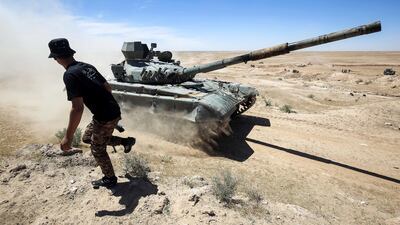Iraqi prime minister Haider Al Abadi warned against those trying to "sabotage" the country's victory over extremists and called for unity to maintain stability as it faces the challenges of reconstruction, corruption and sectarianism.
“Victory over ISIL was achieved due to the unity of the Iraqi army, Hashed Al Shaaby, Peshmerga and local tribes,” Mr Al Abadi said during Iraq’s victory festival.
Hashed Al Shaabi, also known as the Popular Mobilization Forces (PMF), were formed in 2014 after Ayatollah Ali Al Sistani, Iraq's most senior Shiite cleric, urged citizens to take up arms against ISIL militants who had swept aside government forces and seized control of much of northern Iraq.
The militias, which are mostly trained and supported by Iran, are contentious and have been accused of a string of abuses in Iraq.
“Hashed Al Shaabi did not have any political motivation when they liberated areas that were ruled by ISIL. Their intention was to fight for the [freedom of their] homeland,” Mr Al Abadi said.
Despite the declaration of victory, thousands of Iraqis remain missing. In Mosul alone, more than 3,000 people remain unaccounted for more than six months after the defeat of ISIL. Some are believed to have been killed by ISIL, while others were detained by security forces on suspicion of extremist ties. Regardless, bureaucracy, inefficiency and neglect have left thousands of families in limbo.
_______________
Read more:
Mosul still awaits Baghdad's help for reconstruction
Iraq's militias: after victory over ISIL, will next battle be at the ballot box?
______________
The prime minister vowed to combat corruption, which he blamed for the rise of ISIL “The corrupt - who have seized money from the state - are the ones who caused this catastrophe. ISIL would not have been able to spread in Iraq had it not been due to corruption,” he said. “It will be in the interest of those countries that are supporting and standing with us [against corruption and extremism]."
Billions of dollars of state money have flowed into phantom projects used as vehicles for embezzlement. Iraq has been ranked as the 11th most corrupt country in the world in Transparency International's 2016 corruption perception index.
Iraq and Syria have both declared victory over ISIL in recent weeks, after a year in which the countries' armies, foreign allies and local forces drive the extremists out of all the towns and villages that once made up their self-proclaimed caliphate.
However, the US-led coalition against ISIL announced last week that “there are estimated to be less than 1,000 ISIS terrorists in our combined joint area of operations, most of whom are being hunted down in the desert regions in eastern Syria and western Iraq.”
Mr Al Abadi stressed the need for “continued vigilance in the country until the last terrorist is eliminated.”


